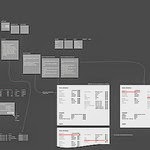- Value desired by the customer (VOC)
- Value stream for each product/service
- Product (service) flow continuously
- “Pull” between steps
- Manage toward perfection
One of the cornerstones not listed as a principle but certainly key the success of your efforts to become more efficient is to eliminate “muda” or waste! It has long been known, and no one will really argue that we waste time each day. How much time do you and each of your employees waste in a normal day? It is estimated that this will amount to 25% of your day, that’s two hours, that’s 120 minutes! Can you find ways to eliminate 10% of that muda, or 12 minutes? If everyone in the office was more effective for 12 minutes each day, let’s say there are five people in the office that means we have improved productivity by one full hour!
This is all well and good. However, your medical practice has to be ready to change from the current way of doing things. This becomes the most difficult part of any effort to improve your patient care. You already are meeting the patient’s expectations, except maybe they complain about wait time. Our practice has been around for 30 years and we have been successful with our efforts, until we’ve had to convert to the electronic medical record. Our cash flow has been more than adequate but now we have issues collecting from patients. We have too many patients and can’t see them all so why do we want to be more efficient so we can see more since we don’t get paid enough to see any one of them anyhow.
This leads us to another aspect that is critical. Do NOT look to fix your entire practice with one effort. Instead, look to find a necessary but small win. Something that will lead to improvement without creating havoc, celebrate this as a victory. Then continue with additional wins, this we refer to as Continuous Process Improvement, CPI! Do not rest on your laurels; instead keep moving forward as your practice sees results the culture of improvement will emerge.
As was mentioned in our first post, times they are a changing and in order to insure survival, it will be necessary for you to change. Awareness of muda and a willingness to implement many of the principles that we talk about will be key to your long-term success.
This is all well and good. However, your medical practice has to be ready to change from the current way of doing things. This becomes the most difficult part of any effort to improve your patient care. You already are meeting the patient’s expectations, except maybe they complain about wait time. Our practice has been around for 30 years and we have been successful with our efforts, until we’ve had to convert to the electronic medical record. Our cash flow has been more than adequate but now we have issues collecting from patients. We have too many patients and can’t see them all so why do we want to be more efficient so we can see more since we don’t get paid enough to see any one of them anyhow.
This leads us to another aspect that is critical. Do NOT look to fix your entire practice with one effort. Instead, look to find a necessary but small win. Something that will lead to improvement without creating havoc, celebrate this as a victory. Then continue with additional wins, this we refer to as Continuous Process Improvement, CPI! Do not rest on your laurels; instead keep moving forward as your practice sees results the culture of improvement will emerge.
As was mentioned in our first post, times they are a changing and in order to insure survival, it will be necessary for you to change. Awareness of muda and a willingness to implement many of the principles that we talk about will be key to your long-term success.

No comments:
Post a Comment